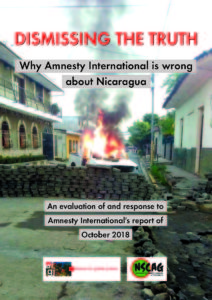In 2018 Amnesty International produced two reports on Nicaragua, accusing the Nicaraguan government of ‘a strategy of indiscriminate repression’. The context was violent protests which broke out in April last year and ended last July. The Nicaraguan government was accused by AI of using ‘arbitrary detention’ and ‘excessive, disproportionate and unnecessary force’ in dealing with the opposition’s violence.
A new report, Dismissing the Truth, not only refutes the claims made by Amnesty International but shows that the evidence they produce is biased, incomplete and in several cases simply wrong. The report, prepared for the Alliance for Global Justice in the US and the Nicaragua Solidarity Campaign Action Group in the UK, was researched and written by an independent group of people based both in Nicaragua and in the US/UK. It uses eye-witness accounts, reports from government and human rights bodies, media analysis and knowledge of the places where events highlighted by AI took place, to examine AI’s analysis and claims.
It shows that:
- The city of Masaya was the subject of armed siege by opposition forces for several weeks. AI claims that the government, in ending this siege, used indiscriminate and lethal force and pro-government armed forces. We explain how, given the failure of peace negotiations, the police were obliged to use armed force to free Masaya from heavily armed actors who had declared their ‘independence’ from the national government.
- Amnesty International wrongly asserts that a police officer killed during the violence was the subject of a possible ‘extrajudicial execution’ by the government for deserting his post. In fact, he was killed by opposition sniper fire, along with a colleague, while carrying out his duties. We explain the details of events surrounding his death.
- Other cases of alleged ‘extrajudicial execution’ or ‘arbitrary detention’ cited by AI can be shown either to be false or to present conflicting evidence. In each case, AI virtually ignores any evidence that contradicts their pre-existing beliefs about the situation.
Dismissing the Truth includes a case study of one region of Nicaragua showing how AI might have carried out a balanced appraisal of the violence and who caused it. It shows that, over a similar period to that covered by AI reports, half the deaths reported as linked to the protests in this region had other causes, and of the protest-linked deaths, all but one resulted from opposition violence.
Dismissing the Truth concludes that AI completely fails to establish its case that there is ‘a strategy of indiscriminate repression’ on the part of the Nicaraguan government.
Based on the evidence in Dismissing the Truth, Alliance for Global Justice and the Nicaragua Solidarity Campaign Action Group both urge Amnesty International either to make a radical change in its approach to judging human rights issues in Nicaragua, or to desist from publishing further reports.
Dismissing the Truth is available here.


 John Perry lives in Masaya, Nicaragua where he works on
John Perry lives in Masaya, Nicaragua where he works on